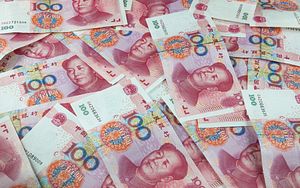On Friday, the International Monetary Fund announced that it would recommend China’s renminbi for inclusion in its elite “Special Drawing Rights” (SDR) basket of currencies. The announcement was a welcome bit of good news for leaders in Beijing who have been trying to keep international perceptions of China’s economic robustness alive and well after a tumultuous summer that saw Chinese equity markets collapse. As the Financial Times put it, the IMF’s signal is, in effect, a “vote of confidence” in China’s ongoing reforms. Notably, the SDR basket inclusion announcement for the renminbi comes not long after the fifth plenary session of the 18th Communist Party Central Committee (CPCC) wrapped up, setting in place China’s thirteenth Five-Year Plan (my colleague Shannon Tiezzi joined me on the podcast to discuss the outcomes of the Fifth Plenum in more detail).
The People’s Bank of China, the country’s central bank, reacted positively and pledged to continue reforms. It acknowledged the SDR invitation as “an acknowledgment of the progress in China’s recent economic development, reform and opening up.”
“Going forward, China will continue to deepen economic reforms and promote financial opening up,” the PBOC added, echoing language frequently used by senior Chinese officials, including Premier Li Keqiang. The bank added that the renminbi’s inclusion will “help improve the current international monetary system, which would benefit both China and the rest of the world.”
The SDR basket milestone is both significant and insignificant, depending on who you ask. Without doubt, the accession of a new currency into the SDR basket is in of itself remarkable. The IMF last added the euro on launch in 1999 and the SDR basket has remained static since (the other currencies are the Japanese yen, the British pound sterling, and, of course, the indomitable U.S. dollar). For a rising–or indeed, risen–economic superpower like China, this is good company to keep. The renminbi has seen encouraging signs elsewhere as far as the story of its rise as a global currency goes. As I discussed in these pages earlier, George Osborne, the UK’s chancellor of the exchequer, saw to it that London would become the first overseas hub for renminbi-denominated Chinese sovereign debt. Additionally, in recent months China has made its bond markets more accessible to foreign institutional investors and central banks. China values prestige in international affairs and, indeed, the IMF’s SDR invitation will put a feather in Xi’s cap.
The IMF’s decision has a good deal of monetary wonkery behind it, which I won’t get into, but the basics are the following: for inclusion in the SDR basket, the renminbi had to meet two criteria. The currency had to both be “widely used” and “freely usable.” As you might guess, the renminbi had no trouble meeting the first requirement given China’s gargantuan footprint as a trading state. The second was the dicier question that required close scrutiny by the IMF. Christine Lagarde, the director of the IMF, noted that after review the Fund determined that China’s currency would qualify. The IMF is expected to make a formal announcement on the renminbi’s SDR acceptance at the end of the month.
Given China’s rise, the renminbi’s inclusion in the SDR basket was a foreseeable milestone. One would be hard-pressed to argue that the renminbi will negatively affect the SDR’s function within the IMF (again, without descending into wonkery, the SDR sets the value of the IMF’s quasi-currency, which is subsequently employed in the Fund’s loans to individual states). However, some commentators, including Tim Worstall, warn against overstating the impact of SDR inclusion, arguing that “reserve currencies, SDRs, even central bank foreign exchange reserves, just aren’t all that important these days.” Indeed, in the longer term the renminbi’s SDR inclusion will do little to diminish or ameliorate the IMF’s ability to secure global financial stability. What it will do, however, is increase the use of and, consequently, demand for the renminbi.
Despite the good news, however, the renminbi didn’t gain value after the IMF’s decision to support the currency emerged. The two criteria for SDR inclusion may be inadequate in convincing investors that the renminbi and assets denominated in the currency are worth holding right away. Indeed, that may come back to the question of China making good on its structural reforms.

































